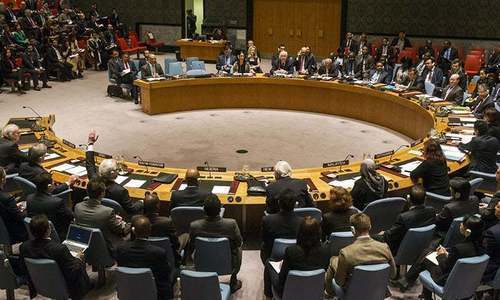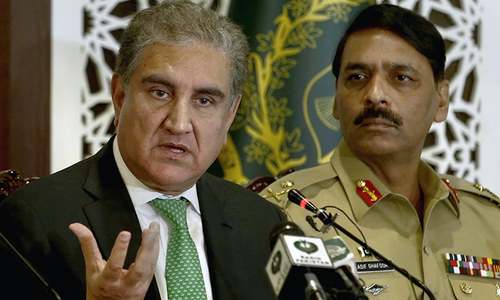WASHINGTON: The US media reminded the UN Security Council (UNSC) on Saturday that it’s responsible for maintaining peace in the world, and this responsibility includes redressing the woes of the Kashmiri people and defusing tensions between India and Pakistan.
“As the (United Nations) diplomatic arm that’s supposed to protect international peace and security, the Security Council should move quickly to get between the two nuclear-armed opponents if there is a significant flare-up,” CNN said in its report on the council’s consultative meeting on Kashmir, held in New York on Friday.
“But for now, it’s only agreed to talk, rather than act,” the report added. CNN then asked the world body how much longer the people in South Asia should wait for the UNSC to play the role of a peacemaker in Kashmir. “Will 50 more years pass before the Council takes up again the hot topic of Kashmir?” asked CNN while pointing out that it took UNSC more than 50 years even to hold a consultative meeting on the disputed land.
A Washington Post editorial reminded Indian Prime Minister Narendra Modi that he was “playing a dangerous game”.
CNN claims two of the five permanent UNSC members and a major Western power prevented the council from issuing a joint statement
“His sunny vows of transparency aside, the stripping of Kashmir’s autonomy was done in darkness and in the most coercive way possible,” the newspaper noted. “Srinagar, streets are no longer crowded with civilians but awash with India’s armed soldiers, and instead of traffic jams at intersections, there are spools of concertina wire.”
Amnesty International’s Secretary-General Kumi Naidoo reminded the Security Council members that they needed to safeguard the human rights of the people of Kashmir.
Idris Bhat, a New Delhi-based Kashmiri journalist, wrote on the Foreign Policy magazine’s news site on Saturday that “the Indian state’s current move, justified in the name of development, could change Kashmir’s ethnic mix.”
Mr Bhat noted that “doing so has been a longstanding demand of the militant Hindu nationalist organisation Rashtriya Swayamsevak Sangh (RSS), which is widely seen as the parent organisation of the ruling Bharatiya Janata Party (BJP)”.
The UNSC consultative meeting, held on Friday on Pakistan’s request, condemned human rights violations in Kashmir, but failed to issue a joint statement. It also failed to schedule an emergency meeting to review the situation in Kashmir.
CNN reported that two of the five permanent UNSC members and a major Western power prevented the council from issuing a statement condemning the unilateral Indian action in the occupied Jammu and Kashmir.
“France, Germany and the United States objected to language that might have broadened the issue beyond the possibility of future bilateral talks between India and Pakistan,” said the report, quoting UN diplomats.
“The priority must go to bilateral dialogue,” the report added.
Another report by Al Jazeera television network noted that in Friday’s meeting, members of the Security Council were guided by their longstanding relationships rather than the need to help the people of Jammu and Kashmir. “The United States is a traditional backer of India and China of Pakistan,” added the report while explain why the council failed to issue a statement at the end of the meeting.
The Bloomberg news agency noted that Friday’s session was “the first full Security Council meeting to discuss the disputed region since 1965”.
One Western diplomat told Bloomberg that even though no decision was reached, “holding the meeting helped calm tensions because it showed Pakistan that the international community is engaged on the issue”.
A UN news service report referred to UN Secretary-General António Guterres’ Aug 8 statement, saying that “the position of the United Nations on this region is governed by the Charter...and applicable Security Council resolutions”.
The Secretary-General also referred to the 1972 Simla agreement which states that “the final status of Jammu and Kashmir is to be settled by peaceful means”, in accordance with the UN Charter.
CNN acknowledged that a 90-minute private debate among Security Council members on Kashmir is notable, but it also asked: “What was the outcome of the closed-door huddle at the United Nations headquarters in New York? Not much.”
UN diplomats told CNN that countries disagreed on wording of a statement, “with some fearing any comment would escalate tensions or would show bias towards Pakistan” by simply holding the meeting.
“This result is completely in line with Security Council inaction on a host of global hotspots in recent years, due to divisions among the big powers that sit on it,” CNN commented. “Still, just dusting off the diplomatic cobwebs was by international standards a big deal,” it added.
Published in Dawn, August 18th, 2019















































